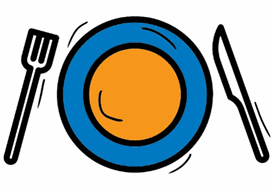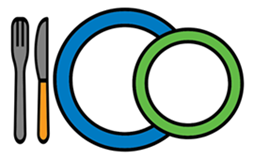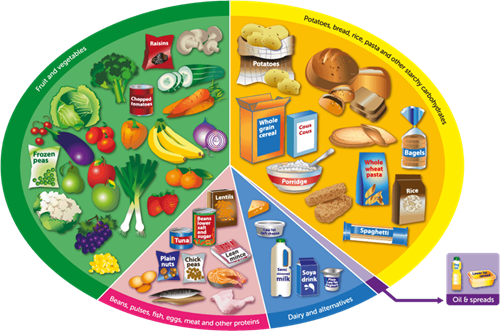Over the years the amount of food  we eat at each meal, or snack time has got much bigger. This is part of the reason that more people are overweight.
we eat at each meal, or snack time has got much bigger. This is part of the reason that more people are overweight.
It can be hard to know how much food is enough for ourselves and our children to eat. Also there are so many drinks to choose it can be hard to know what is best for your children.
A healthy, balanced diet means not only eating the right types of food and drink, but also eating them in the right amounts. How much a child needs will vary with age, body size and how active they are.
Portion Sizes
At different ages, children will require  different amounts of food to meet changing energy and nutrient requirements. They may eat varying amounts from day-to -day, particularly younger children. This is normal behaviour.
different amounts of food to meet changing energy and nutrient requirements. They may eat varying amounts from day-to -day, particularly younger children. This is normal behaviour.
As long as they are having a varied diet and growing well, it is likely that they will be meeting requirements.
It takes about 20 minutes for the brain to send signals that you are full, by eating slowly children will learn to recognise when they are full.
Developing Good Eating Habits
Children need a varied and balanced diet to provide energy and nutrients for growth, development and activity. There are ways you can encourage your child to eat what they need and stop when they are full;
A routine is very important. A child should be offered regular meals and snacks, rather than giving food whenever they ask.
At meal times try not to offer your child foods you know they will eat or extra snacks. This can get in the way of your child’s eating instincts. If they are well and have bags of energy, then they are likely to be getting it right for themselves.
If you still feel worried you can contact us on the number below for reassurance and support.
Family Mealtimes
Try to make your family mealtimes happen at regular times. Eat together as a family whenever you can, this helps model good eating behaviour and gives the opportunity to spend time together.
The average size of a UK dinner plate has grown by about 5cm since the 1950's
We can divide the foods we eat into 5 main food groups.
For a healthy and balanced diet, try to choose a variety of different foods from each of the groups. This way you get the wide range of nutrients needed to stay healthy.

Snacks including chocolate, cakes, biscuits, sugary soft drinks and ice cream are not needed in our diet, so should be eaten less often and in smaller amounts.
Drinking lots of fluids is an important part of keeping well. Drinking can help with portion control. It is easy to mistake feeling thirsty for feeling hungry. The key is to offer drinks regularly throughout the day.
Children should aim for six to eight cups or mugs per day. The amount per cup depends on the age of the child:
If you are concerned about your child’s weight or eating habits and feel you need support then you can contact the Healthy Child Programme by calling Just One Number on 0300 300 0123 or texting Parentline on 07520631590. Our opening hours are 8am-6pm Monday-Friday (excluding bank holidays) and 9am-1pm on Saturdays.
If you are 11-19 you can text ChatHealth on 07480635060 for confidential advice from one of our team.
Alternatively you can go to see your GP to discuss concerns.
To speak to other Norfolk parents and carers, you can join our online community forum below.